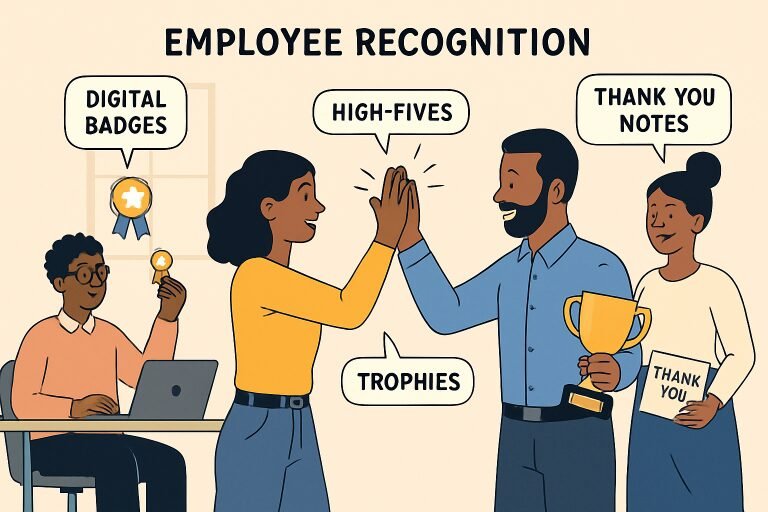Today’s workplaces demand more than just traditional recognition. With rapid shifts in the work environment, a simple “thank you” or once-a-year award ceremony is no longer enough to keep employees engaged and motivated. Modern employees thrive in environments where they feel genuinely valued and understood through annual ceremonies and everyday, thoughtful acknowledgment from their peers, leaders, and even the company’s culture. Establishing an ongoing culture of appreciation can make the difference between a workforce that feels disconnected and one that actively contributes to organizational success. One powerful way to promote this culture of appreciation is by integrating meaningful tokens like corporate awards into the recognition process, presenting tangible reminders of achievement and gratitude that resonate personally. Embracing diverse, innovative strategies boosts morale and enhances employee engagement, productivity, and retention.
Organizations that actively tailor their recognition efforts to individual preferences are seeing growth in workplace satisfaction and overall business success. With a more diverse workforce than ever—encompassing a variety of backgrounds, generations, and workstyles—blanket recognition efforts often fall flat. By moving beyond generic gestures and focusing on real-time, personalized, and tech-enabled initiatives, companies create a more connected and motivated workforce—essential to thriving in the modern corporate landscape. Whether through public appreciation, digital tools that facilitate instant feedback, or wellness initiatives that show care beyond mere output, recognizing employees meaningfully has become a pillar of progressive leadership and organizational health. These tailored methods ensure appreciation is felt throughout an organization rather than reserved for a select few, further enhancing inclusivity.
Personalized Recognition
Employee recognition is most effective when personalized to meet each individual’s motivations and interests. Gone are the days of “one-size-fits-all” rewards that fail to resonate with anyone. Today, leaders are encouraged to engage in ongoing conversations with their staff to discover what truly inspires them—whether it’s public acknowledgment in front of their peers, extra time off for work-life balance, or access to career development opportunities that support professional growth. Offering employees the choice between rewards such as gift cards, unique experiences, or educational courses ensures that recognition feels sincere and highly relevant. This flexibility in recognition also underlines a commitment to equity and fairness, as employees’ unique life and career stages can be considered. Such approaches send the message that the organization values the unique contributions of every team member, empowering individuals to feel seen, heard, and truly part of something greater. Personalized recognition can become deeply integrated into an organization’s culture, leading to stronger loyalty, better job performance, and increased overall satisfaction.
Technology-Driven Recognition
Technology is reshaping the landscape of workplace recognition. With the advent of specialized apps and digital platforms, companies can deliver instantaneous appreciation and ensure that acknowledgment doesn’t fall through the cracks, even in remote or hybrid work contexts. For example, platforms that allow “shoutouts” or virtual badges make it easy for colleagues and managers to celebrate daily wins in real time, bridging the gap between departments and time zones. Digital recognition platforms also allow for records and analytics, enabling organizations to measure and continuously improve their efforts. As noted by Gallup, technology-enabled recognition systems can significantly influence how employees perceive their value and impact, driving continuous engagement and retention. This streamlined approach eliminates bottlenecks and the administrative burdens of manual tracking, making frequent and consistent recognition not only possible but effortless. When technology empowers everyone in the company to participate, it cements recognition as a daily practice and a shared responsibility.
Gamification in Recognition
Adding gamification elements to recognition programs transforms routine acknowledgment into a dynamic and motivating experience. Features like leaderboards, point systems, and achievement badges introduce friendly competition, keeping employees invested and excited about reaching key milestones. Even simple contests around reaching sales targets, innovation milestones, or positive customer feedback can inspire teams to do their best while having fun. Gamification fosters a spirit of achievement but must be managed carefully to encourage healthy competition rather than rivalry. To avoid potential downsides, transparent rules and inclusive participation should be priorities. Allowing employees to participate in team-based challenges or collaborative goal-setting can help foster camaraderie and shared success, making recognition a collective endeavor. When structured thoughtfully, gamification becomes a powerful lever for sustained engagement and performance that appeals to employees’ intrinsic motivation and can enliven the workplace atmosphere. Periodic refreshes and creative new games can keep engagement high year-round, preventing fatigue or repetition.
Peer-to-Peer Recognition
The most vibrant work cultures are those where appreciation comes from every level—not just the top. Peer-to-peer recognition programs enable employees to acknowledge their colleagues’ support, creativity, and hard work, fostering an atmosphere of mutual respect and teamwork. Unlike traditional top-down models, peer-driven recognition highlights the value of direct collaboration and often catches behind-the-scenes contributions that leaders may not see. This grassroots approach diversifies the sources of praise and ensures that even the less visible contributions are not overlooked. As teams become increasingly cross-functional and projects more collaborative, empowering employees to recognize the strengths and efforts they see firsthand makes sense. According to Gallup research, employees who feel recognized by peers are more likely to be satisfied, collaborative, and engaged in their work. This type of recognition builds trust, strengthens relationships among team members, and contributes to a favorable organizational climate that supports retention and innovation.
Wellness-Focused Recognition
Modern recognition extends beyond plaques and praise—acknowledging holistic well-being’s importance. Companies that offer wellness incentives such as gym memberships, mindfulness apps, wellness retreats, or flexible scheduling show that they value the whole person, not just the output. Initiatives like nutrition programs, counseling services, or stress-reduction workshops address a full spectrum of employee needs, demonstrating genuine care. Recognizing achievements related to health and well-being, like participation in fitness challenges or progress toward personal wellness goals, inspires employees to nurture their physical, emotional, and mental health. Wellness-focused recognition reinforces that well-being is integral to success and not just an afterthought. These initiatives underscore the organization’s commitment to sustaining a happy, productive, and resilient workforce by taking proactive steps to prevent burnout and promote balance. A healthy workforce in mind and body is better equipped to be creative, focused, and dedicated to meeting personal and company goals.
Conclusion
Empowering employees through innovative and thoughtful recognition strategies is key to cultivating a motivated, loyal, high-performing team. Recognition is no longer a trivial matter relegated to annual events—it’s a daily investment in people. By leveraging personalized rewards, leveraging technology, implementing gamification, encouraging peer-to-peer appreciation, and prioritizing holistic wellness, organizations can set themselves apart as great places to work. The benefits extend beyond morale, shaping business performance and brand reputation in a competitive marketplace. With the right recognition culture, employees and organizations can thrive—achieving goals together and nurturing lasting success in an ever-evolving workplace environment. As companies evolve their recognition strategies, they ensure that everyone feels significant, appreciated, and inspired to give their best daily.

